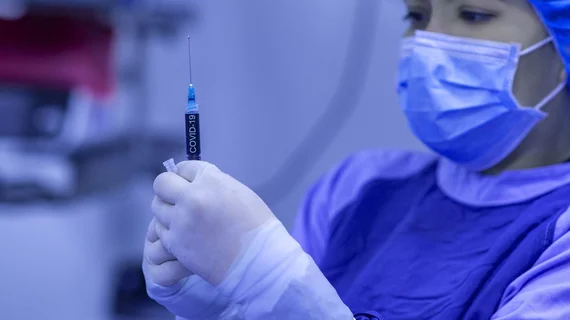CMS to require COVID-19 vaccination at care facilities that accept Medicare, Medicaid by Jan. 4
The Biden administration issued an emergency order Thursday requiring eligible employees working at healthcare facilities that accept Medicare and Medicaid to get vaccinated against COVID-19 by Jan. 4.
Federal officials said the requirements apply to some 76,000 facilities employing more than 17 million healthcare workers across the U.S. Those covered include hospitals, ambulatory surgical centers, and clinics, among others.
In justifying the decision, the administration cited the continuing proliferation of COVID-19 and particularly the delta variant. Unvaccinated staffers run the risk of contracting the virus, spreading it to patients, and exacerbating ongoing medical worker shortages, officials said.
“CMS knows that everyone working in healthcare wants to do what is best to keep their patients safe,” the agency said in a Nov. 4 statement. “Yet, unvaccinated staff pose both a direct and indirect threat to the very patients that they serve. Vaccines are a crucial scientific tool in preserving and restoring efficient operations across the nation’s healthcare system while protecting individuals.”
Facilities covered by the regulation must ensure that all eligible staff receive their first of two-dose vaccines or single shot of the Johnson & Johnson option by Dec. 5. Second doses must be administered prior to Jan. 4. The rule carves out exemptions for certain medical conditions and religious beliefs but does not offer a testing alternative.
Major U.S. provider groups urged Americans to get vaccinated Thursday as the country marked 750,000 deaths from the virus. They pointed to previous studies showing that those who do not receive the shot are 10 times more likely to be hospitalized and 11 times more likely to die from the novel coronavirus.
“This devastating milestone should serve as a reminder to everyone that the COVID-19 pandemic is not over and still poses a major threat to our society, particularly to the unvaccinated,” the American Medical Association, American Hospital Association and American Nurses Association said in a joint statement. “The only way to truly end this pandemic is to ensure widespread vaccination and continue taking the preventive public health measures that we know work in curbing the spread of this virus.”
Meanwhile, the Occupational Safety and Health Administration also issued emergency standards Thursday requiring companies with 100-plus employees to mandate vaccinations or undergoing regular COVID testing and wearing a mask. President Joe Biden originally ordered both agencies to produce policies requiring vaccinations back in September, but this week’s announcements set the firm Jan. 4 deadline.
The Centers for Medicare & Medicaid Services interim final rule is subject to a 60-day comment period. Florida Gov. Ron DeSantis announced a lawsuit against the Biden administration Thursday to halt the OSHA rule.
“It is important to stand up for people’s individual ability to make decisions for themselves,” he said in a statement. “And the practical result is that this is going to exacerbate a lot of the existing problems that we are seeing with the economy.”

